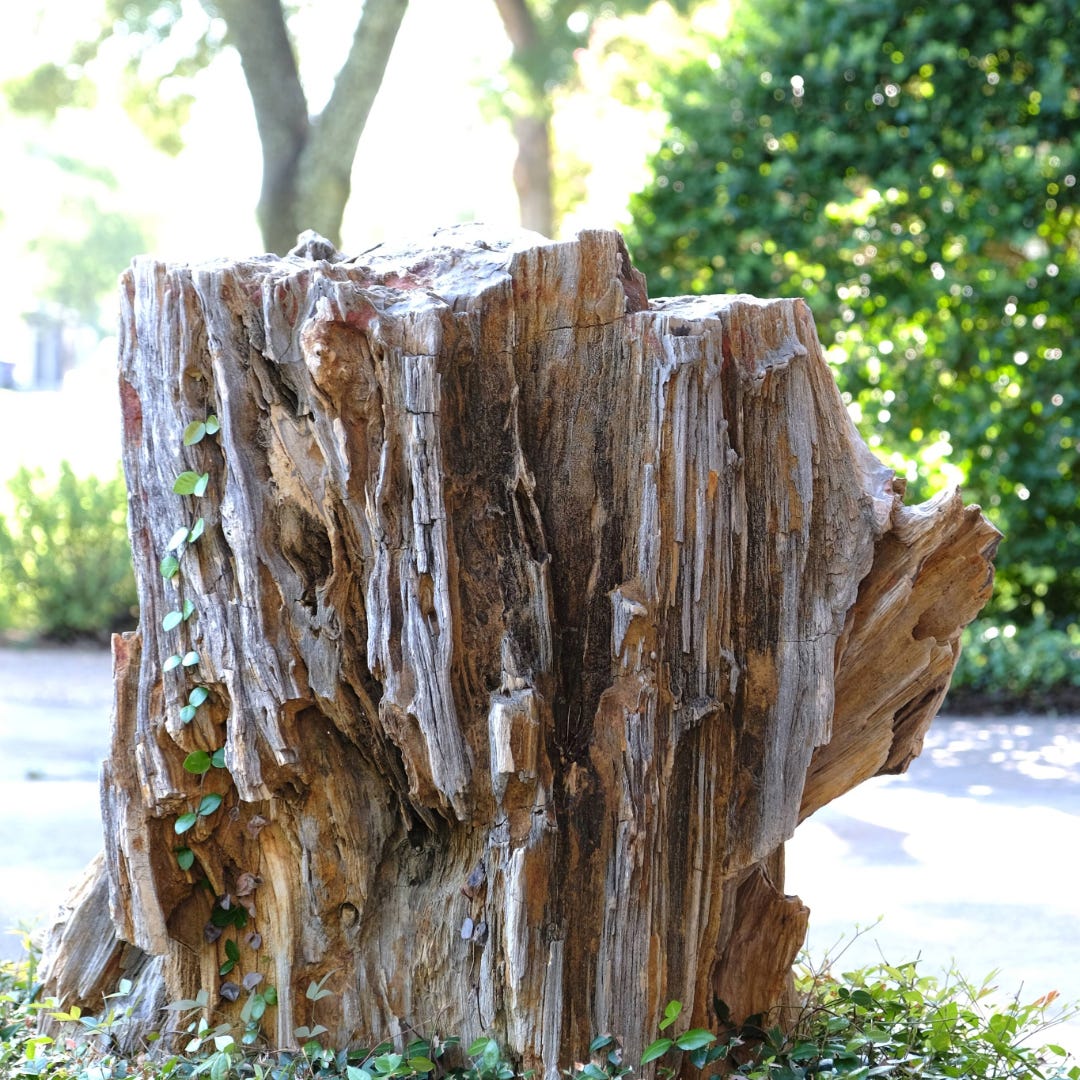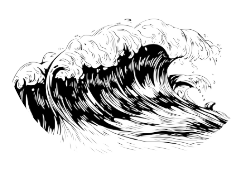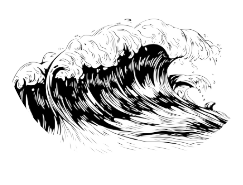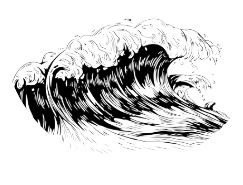a monument to the magical
By Nicole Schiro Magee
DAD TOLD THE STORY LIKE THIS: the year was 1971. The place: the Pineywoods of East Texas. Around two o’clock one morning, there was a bangin´ on the trailer door, followed by the voices of Smitty and Lewis, drunk and hollerin´, “Nick! Nick! You home?” Nick was my dad. He and my mom owned Nick’s, a bar and grill a couple of miles down the road. Smitty and Lewis frequented the place when it was open. Dad stumbled out of bed, made his way across the avocado green shag carpet to the front door, opened it, faced the men in his tighty-whities, and exclaimed, “What the hell are you doing here?!”
“Hey, Nick. We got something in the back of the truck we want to show you,” Smitty said.
“It can’t wait ´til the mornin´?”
“No. No. It’s urgent,” Lewis said.
Dad shut the door, leaving the men on the plywood stoop with the confusion of a groggy guineafowl, and emerged less than two minutes later, fully clothed.
“We been workin´, clearin´ the woods down the highway and found this.” One of the men shined a flashlight into the bed of the truck on what appeared to be a giant tree stump, around three feet tall and six feet in diameter. “It used to be a tree. We dug it up. This was the nicest piece.” My dad examined the specimen.
“Well, that is purty, ain’t it?”
“Yep. Thought you’d like it.”
“I really do.”
“Trade you a six-pack for it.”
Dad did not need time to think. “That’s a fair deal,” he said and shook on it.
That’s how my family came into possession of the petrified stump. I was only two years old, too young to remember it. How my dad and these two drunken men moved the glorious rock with its sinewy bark off the bed of the truck and into our yard is a mystery. In my brother Danny’s estimation, the thing weighs about six hundred pounds, and he’s only ever seen it moved by a tractor.
Less than a year later, my parents closed Nick’s, and we moved a few miles closer to Houston, where my dad went back to work as a union electrician. We parked our standard, white single-wide trailer square in the middle of a heavily wooded, one-acre plot of land in a small neighborhood called Hunter’s Retreat. We shared the lot with families of possums, squirrels, blue jays, and cardinals. A great horned owl lived in a giant old oak and softly hooted in the night. The petrified stump was situated next to a bird bath in the center of a circle of three young trees, two pine and one oak, just a few feet from our front door. If you wanted to reach the center of the circle from the oak side, you had to get down on your hands and knees and crawl on the pine-needle-blanketed ground, which, much to my mom’s chagrin, was my favorite way to go about getting there. She was always afraid I would stir up a copperhead snake, get bitten, and die on the way to the nearest hospital, which was in the neighboring town, twenty minutes away.
That little circle of trees was the place of my childhood dreams. One of my earliest memories is of standing on a small wooden stool to see out the front door into the circle and finding a green anole lizard stationed between the window and the screen, eyeing a spider. The anole’s vibrant, green apple candy-colored scales, wide smile, and side-eye glances made me squeal with delight. I named him Fred. There were always plenty of little bugs for Fred to snack on behind that screen, and I would often find him, or some other anole that I thought was him, relaxing there.
The petrified stump was the centerpiece of the Hunter’s Retreat property. We took all our family photos in front of the stump, because it was a far more beautiful background than the front of the trailer. One of my most treasured family photos is of Danny and me standing in front of the stump around the time I made friends with Fred. I was three years old; Danny was eight. He stood in brown corduroy bell bottoms and a red shirt with white racing stripes down the sleeves with his arms crossed, smiling straight into the camera. I stood to his right, my legs spread wide, wrapped in mustard-colored bell bottoms, my arms clasped behind my back, and my head tilted upward, beaming at him in adoration. We looked sure of ourselves, ready for adventure. But at some point, that confidence began to fade.
A lot went on in that trailer, behind that petrified stump. In Dad’s estimation, Danny could never do anything right and I could never do anything wrong. Danny was Mom’s son from one of two previous marriages and was a baby when Mom and Dad met. But I don’t think that was the reason for Dad’s treatment of him. I believe Dad made Danny the scapegoat and me the golden child because that’s what my grandfather did to him and his sister, my Aunt Evangeline.
It’s no secret that my grandfather abused my dad and adored Evangeline. My grandfather was the son of poor Italian-American immigrants. He grew up in the French Quarter of New Orleans, played the trumpet, and dreamed of being a professional jazz musician, a dream which never came to fruition. He worked on and off as a butcher to get by, but despite having a wife and four children to support, never had a steady job. I think his father treated him poorly as well. At any rate, it must have been pretty bad at home for my dad because he left when he was fifteen. He lied about his age so he could join the Navy and fight in the Korean War. In my dad’s mind, fighting the enemy on strange waters in a distant land was better than fighting with his father in the war at home.
Whenever Evangeline witnessed Dad treating Danny with cruelty, she would always say, “He’s just like the old man.” One evening when I was around four, I was sitting on Dad’s lap at the kitchen table, dialing up an imaginary friend on an old telephone I liked to play with. Mom was cooking dinner. I looked up at Danny a few feet away in the living room with his eyes glued to the tv, and Dad whispered in my ear, “Go hit Danny upside the head with that phone.” I slid off Dad’s lap and walked over to Danny, the telephone in hand, lifted the receiver, and struck him on the top of his head. He let out a scream and I instantly understood that what I had done was wrong. Tears flowed down his cheeks as a welt formed under his hair. Mom ran over to us, grabbed my arm and screamed, “Why did you do that?!” Even at that young age, I think that, on a primal level, I knew I was better off if I always did what my dad told me to do even when it went against my better judgment. “Daddy told me to,” I cried.
“You didn’t have to do it! You know better than that! You’re just like him. You’re just like your Daddy.”
From that point on, that’s what Mom would say when she disapproved of something I said or did. Even a small thing like rolling my eyes at the suggestion of hamburgers for dinner would prompt her to shoot me a look with her steely-gray laser eyes and proclaim, “You’re just like your Daddy,” and all the shame I felt that day when I hit Danny over the head would come rushing back to me. She wasn’t taking sides. In addition to protecting Danny, she was trying to teach me how to follow my better judgment. She shamed me to make her point clear, but did not understand that shaming, as a form of discipline, was damaging to my self-esteem and emotional wellbeing. She wanted me to have empathy, but her words made me feel like I was inherently mean. She also made me feel responsible for Dad’s behavior and as if it was my job to divert his attention away from Danny, so I committed myself to being the perfect daughter.
I tackled baton twirling first, marching in parades on a team of little girls called Annie’s Angels, led by Annie, a featured baton twirler for our town’s one high school. We wore strappy, shiny, lavender leotards decorated with white sequins and ruffled lace and halos made of silver pipe cleaners on top of our heads. Annie was my first role model. She told me that if I kept practicing, I could be a high school twirler too. In addition to twirling, at the end of my fifth grade year, I signed up to play French horn in the junior high school band because Dad loved music and I knew that excelling at an instrument would make him proud.
Being in the band also made me feel more connected to Danny, who played the trombone in the high school band. I wanted to be like him. He always received the highest mark of “One” in the school solo and ensemble competitions and he was popular. He and eleven other boys liked to pull harmless pranks together, like covering a fellow bandmates’ car in shaving cream. They called themselves the “Dirty Dozen.” I was too introverted to ever have a posse like that, but band gave me the chance to make a couple of friends and have some fun. I loved it so much that practicing my baton twirling and my French horn at home every single day, sometimes for hours, didn’t seem like work.
At the beginning of my seventh-grade year and Danny’s senior year in high school, all my practice paid off when I made first chair horn player. Danny, who never practiced outside of school, made second chair. At dinner one night, Dad expressed his disappointment. “You could be first, number one, like your sister, if you weren’t so lazy.” Danny cast his eyes down at his plate of his favorite dinner, Mom’s homemade spaghetti and meatballs, half eaten. “You’re not going to amount to anything because you’re a fuck-up,” Dad pronounced, then shoved his empty plate across the table and tramped off to lock himself in his bedroom. Danny exhaled in disgust. Mom got up and silently started clearing the table. I sat there, feeling guilty for one-upping Danny. I wanted to punch a hole straight through my solar plexus to let out the pressure from the swirling storm that had formed inside. Despite my efforts to be the perfect daughter, the relentless disparagement that my brother endured never changed. It also took a toll on my relationship with Danny. Although he never turned against me, there were times when I would make a silly joke about someone’s outfit or hairstyle, and he would look at me with disdain and sneer, “You think you’re so perfect.” In truth, I joked about others to feel better about myself. I hated the way my clothes fit; my thighs were chunky and rubbed together when I walked. My hair was a long, frizzy, unkempt mess. My nose was wide like my dad’s instead of narrow and cute like my mom’s. Worst of all, as math became more advanced, I became less able to understand it, which kept me from being a straight-A student, something that did not sit well with the achiever in me.
When I was a freshman in high school and Danny was a sophomore in college, Mom took another photo of us in front of the petrified stump. We were wearing our marching band uniforms. The football team for the university Danny attended had made it to the Cotton Bowl and he was off to Dallas to march in the halftime show. As Annie had predicted, I was a featured baton twirler for the high school marching band. My uniform was a classic military majorette style: a jacket with bronze buttons, over-the-shoulder braids, short shorts, and tasseled white boots. In the photo, I am holding two batons and smiling as if my life depended on it. Danny’s uniform was more modern and much more stylish than mine, with an audacious white, waist-length cape gliding over his right shoulder. He is holding his trombone, and in addition to the cape, he wears the kind of smirk you see on awkward people who have a chip on their shoulder and something to prove. We were no longer the carefree children in the picture from our childhood. Danny had become the wrong type of rebellious and was developing a worrisome drinking habit; I had become afflicted with a nervous, machine gun laugh that everyone at school made fun of. I no longer took refuge in the circle of trees and chasing lizards around the petrified stump. I was too busy working harder and harder so I could win medals, trophies, and accolades to try and prove my worth.
Two years later, I went to The University of Texas and majored in acting, which was my passion at the time. Danny and I had both moved on from playing music, the one thing we always had in common. From then on, we only talked when we were home visiting for the holidays. In 1995, I graduated with a BFA and moved to New York where I juggled auditions and sporadic gigs with my day job at a fledgling non-profit organization. My boss was a nice man, a rabbi, who supported my dream of becoming a professional actor while emphasizing the importance of financial stability and family. Having a family was simply too terrifying a prospect. When I started that job I was in a place where having two cats stressed me out—I was afraid I would favor one over the other. But after six years of showing up and working with people who depended on and valued me, I came to understand that I was capable of overcoming my past. I got a therapist who helped me to unravel my childhood and eventually I opened myself up to meeting people like Ted, who would be my future husband.
Danny and I grew further apart as he struggled with relationships and sobriety. He got married, joined the Air Force, had a son, got divorced, graduated college, got married again, moved back to our hometown, got divorced again, and started a career in oil and gas. Mom was the one constant in his life and he relied on her for emotional support. I think I spoke to him on the phone twice during the fifteen years I lived in New York. He called me once out of the blue and asked if I would make him a mixtape of my favorite Depeche Mode songs, and I happily agreed. Another time, he called me from JFK Airport on his way to visit a girl in Russia he met online. Mom called me afterwards complaining, “That girl is scamming your brother.” It annoyed me that she was talking about Danny behind his back. I thought, if she talks about him to me then she must talk about me to him and I was over it. He was a grown man who could take care of himself. And it did not matter what we thought about it. I found an excuse to end the call.
Dad retired and he and Mom bought twenty acres of brambly land deep in the backwoods at the end of a long, dirt county road. The shells of two incomplete prefab homes sat abandoned on the property, rotting into the ground. Mom and Dad dove in, spending three years clearing the land, rebuilding the little houses, and gradually moving all the clutter they had hoarded over the years to the larger of the two homes. The petrified stump landed in the middle of their front yard. When I would visit them every six months or so, I would always smile at the sight of it in their driveway, where it emanated its positive energy. It triggered good memories. Mom and Dad seemed happy, and were doing surprisingly well without Danny and me. Their favorite pastime was searching for treasures in little antique and junk stores in nearby towns. It was amazing how something as simple as a 1970s figurine of an old lady holding a mop with the caption “To Hell With Housework” could bring them so much joy. I was sad that they couldn’t have found that happiness when I was a kid, but also relieved that they had found peace.
In the mid-2000s, Danny fell into financial trouble. He was terrible with money, and his two divorces did not help. He lost his house, tanked his credit, and although he had a good job with good pay, he was facing eviction from the trailer he rented. Mom and Dad came to the rescue. They let him move into the smaller of their two houses. Mom seized control of his finances, put him on a strict budget, and after a few months proposed that he buy the little house and ten acres from her and Dad directly, on installment, without a bank loan.
Mom, Dad, and Danny all considered the plan a win-win. Danny traveled a lot for work. By moving next door, Mom and Dad could keep an eye on his place when he was away, and he could keep an eye on them as they advanced in age. But not long after Danny signed the contract to buy the property, the fighting began. Mom was not willing to give up control of Danny’s finances until she “got all her money” for the house and land, and Danny was angry about it. Danny was still drinking, and had gotten two DWIs, which understandably upset Mom and Dad. Mom grew increasingly anxious. Dad was aggravated all the time, and ready to have a knock-down-drag-out over the tiniest offense, like Danny mowing his grass on Tuesday instead of Monday. It was a shitshow.
Then, something great happened. Danny reconnected with Cass, a woman he had known in high school. Cass loved him unconditionally, which turned out to be all he ever needed. He settled down and got his drinking under control. Within a year, they were married.
Ted and I had moved from New York to Austin a year and a half after we got married, just before our daughter Alma was born. Every couple of weeks or so, we would drive out to see Mom and Dad so they could visit with Alma. If Danny and Cass were home, we’d visit with them too. Cass had a huge garden, goats, and lots of birds, including peacocks, ducks, turkeys, chickens, and a confusion of guineafowl. Alma would have a ball chasing the birds and petting the goats while Danny, Cass, Ted, and I caught up. After an hour or so, we would return to Mom and Dad’s with homegrown veggies and a carton of eggs. Once, we walked in, and Dad said, “I wouldn’t eat those eggs. They haven’t been pasteurized.” He resented our going over there and his resentment grew with each visit.
The terrible thing is that I reverted back to my old ways of always doing what Dad wanted me to do. Dad did not want me to go to Danny’s house, and so we stopped going to Danny’s house. I wanted to keep things light for Alma’s sake. I did not want to fight with my dad. Not going to Danny’s was easier. Of course, Danny felt that I was rejecting him. I realized every time I chose my relationship with Dad over my relationship with Danny it was a tiny betrayal. And in the end all those tiny betrayals added up to a rift between us, but I still chose Dad.
At Mom and Dad’s, I would try to change the subject when Dad ridiculed Danny for spending all his money on tractors or complained about Cass’s birds making too much noise. Every time Dad started in, my heart would pound in my ears, and anxiety would claw at my throat. I wanted to take one of the rat traps from the cupboard and snap Dad’s lips closed with its steely hinge and scream, “Devil!” Mom would remain silent, her face red, her eyes welling up with tears, hurt that Dad was keeping us from visiting Danny. It was a mad house, the mad house of my childhood. I felt like swooping Alma off her feet, grabbing Ted by the hand, and making a run for it. But I also wanted Alma to know them. I wanted her to love the things I loved about them. The way Mom stitched quilts and made red velvet cake with ermine frosting, the way Dad rewired old radios and shuffled through his vast vinyl collection in search of perfect melodies to match the moment. For that, I sacrificed my relationship with my brother.
When Mom went into decline, she asked me, “What are you going to do with that rock? Dad wants you to take it before we die. He doesn’t want Danny to have it.”
“Oh, my God,” I said. “Can we please not talk about this right now?”
“You’re gonna have to figure out how to move it.”
“Fine. Ted and I will think about it.”
We did not think about it. Soon after, she gave up, stopped taking her oxygen, and died, unable to breathe. A few months later, Dad was diagnosed with stage four colon cancer and refused treatment. We moved him into an assisted living facility near my home. The petrified stump stood watch as their abandoned house, once again, rotted into the ground.
After Dad died, the petrified stump was the only thing I wanted from my parents’ place. One cold day, Ted and I stood in the rain, our furniture dolly buried in the mud, puzzling over how to move the rock tree, heavy as a grizzly bear, older than humankind, when Danny came rolling through a clearing in the woods in his backhoe. He shouted out, “Y’all look like you need some help,” and then scooped up the colossal stump and gently placed it into the back of our truck.
I planned on putting the petrified stump next to the bird bath in our backyard under a canopy of cedar elms and Alma’s treehouse, but without Danny and his tractor, Ted and I were only able to roll it off the back of the truck and let it land where it landed, which was in a patch of ivy next to our front porch. It’s a good place for it. In summer afternoons, anole lizards like to sit on top of it and bask in the sun. The petrified rock stands, a monument to the magical moments of my childhood—the moments I keep close—the moments that propel me forward. I think about that little girl crawling around on the forest floor with pine needles in her wild hair searching for joy in a sad and confusing reality, and I am so proud of her for finding her way out.
About the author:
Nicole Schiro Magee is a former professional actor and higher education administrator. She holds an Ed.D. in Leadership and Higher Education, an M.A. in College Student Development, and a B.F.A. in Acting. She lives in Austin with her husband, Ted, and daughter, Alma.










Oh my. I love the accumulated wisdom in your piece - the understanding of the intent, both good and misplaced, of shaming. Thanks for writing this.